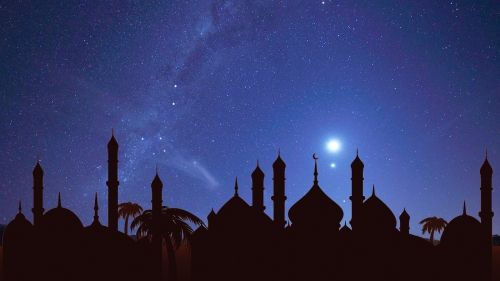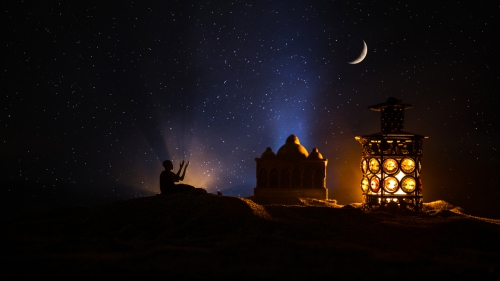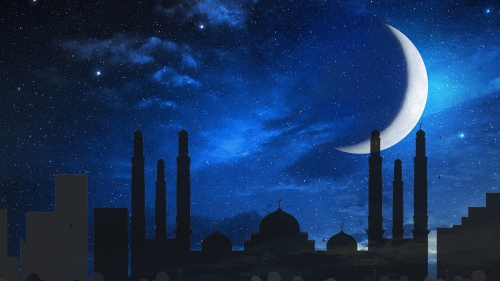Life as a Journey of Self-Actualization

Allah says in the Qur’an: “When your Lord drew forth from the children of Adam from their loins their descendants and made them testify concerning themselves (saying): ‘Am I not your Lord (who cherishes and sustains you)?’ They said: ‘Yea! We do testify!’ (This) lest you should say on the Day of Judgment: ‘Of this we were never mindful’” (al-A’raf, 172).
Allah also says in a Hadith Qudsi: “I created all of My servants as hunafa’ (pure monotheists), but the devils diverted them from their belief” (Sahih Muslim).
The Prophet (pbuh) said: “No child is born but upon fitrah (the natural disposition/inclination/sound human nature that Allah instilled in mankind)” (Sahih Muslim). In another version of this hadith, it is added: “…then his parents make him into a Jew or a Christian or a Zoroastrian.”
According to the dominant opinion of scholars, the above three quotations speak about the same thing. The notions of covenant between Allah and Adam’s progeny, the original state of pure monotheism in people, and the sound human nature, are virtually synonymous with each other.
The gist of the three passages is that Allah took from the loins of Adam his progeny like tiny particles, and made them testify concerning themselves that He was their Creator and Master. Every new born in this world is born with this covenant and affirmation. That means that everyone is born with the natural inclination towards Islam as the ultimate truth and so, the only religion with Allah; the natural inclination -- or pure human nature -- which Allah instilled in all people on the day of the covenant. In their capacity as the creation and mere servants, all humans are born with the inclination towards their Creator, Master and Sustainer. Everyone is initially free of any false beliefs, and will always enjoy a disposition towards goodness and sound beliefs -- regardless of his adopted behavioral patterns -- while at the same time innately disliking evil, deceit and falsehood.
Having been born thus, the task of every person is to remain as innocent, pure, natural and true to himself as possible. In other words, every person is to be and stay himself, and nothing else. His existential purpose and mission have been determined by his Creator, so his job is only to stay the course and not give up on himself. The biggest tragedy, however, is when a person spends – or wastes -- his whole life futilely pretending and trying to be something he was not meant to be, or when he engages in a losing battle against the nature of his very self and the nature of some of the immutable constants of Allah’s system.
It follows that a person does not actually become a Muslim; he is born as such. He only needs to strive to remain so, or become a better one. When someone in real life embraces Islam and becomes a Muslim, he only comes back to what he had originally been and was always meant to be. He only sets things right again. He rediscovers himself.
Thus, we do not say that a person converted to Islam, for converting denotes changing or altering a thing from something to something else, and a person never becomes a Muslim for the first time, after he had been something else. Rather, we say that a person reverted to Islam, for he originally was a Muslim, but at a point of time and due to some external factors, veered off the straight path. He eventually realized his errors, and regretful, decided to go back to his primordial self.
Life, it goes without saying, is an extremely serious and meaningful business. It signifies living only as Muslim -- i.e., in complete submission to the will and command of the Creator and Master of the universe -- and dying only as such. It entails unreservedly accepting and living the tenet that man is a servant and Allah his Master, and whatever happens in the course of man’s either successful or failed performing of his worldly mission, there can never be an exchange in titles: the servant must remain the servant forever, and the Master must remain the Master forever.
A person is not to live according to his own will and command, because they are both relative and mundane. Within the scopes of the philosophical enquiries and the statutory excursions relating to the ontological scheme of things, man cannot be at the same time the subject and the object, the source and the target, the saviour and the saved. That is incomprehensively complex and well beyond the reach of man and his rational and spiritual abilities. Trying to do so is too arrogant and preposterous a course of action.
Things were meant to be much simpler, more straightforward and more easily attainable. Thus, while Islam is described both by Almighty Allah and the Prophet (pbuh) as an easy and natural religion, philosophy, on the other hand – as a rival of religion -- is dubbed almost by everybody, including philosophers themselves, as too difficult, unfathomable and hardly practical a subject. Indeed, it is only Allah who beckons by His grace to the Garden of bliss (paradise), the abode of peace and forgiveness (al-Baqarah, 221; Yunus, 25). Hence, Allah emphatically reminds in the Qur’an: “O mankind! It is you that have need of Allah, but Allah is the One Free of all wants Worthy of all praise” (Fatir, 15).
Human fitrah is not a finished article. It is no more than an extraordinary potential, or a capacity, planted within people, which must be vigilantly taken care of and fully optimized. It is a means for achieving a higher set of goals, not a goal, or an end, in itself. The goal is that fitrah propels man to becoming the exemplary vicegerent of God on earth, whose total actions, words and thoughts will be in full conformity with heavenly paradigms, and whose terrestrial legacy, attesting to and validating the former, will be nothing short of comprehensively virtuous cultures and civilizations. In other words, the goal is man in his totality and his complete ontological (well)being.
Fitrah can be neglected or forgotten, but never fully extinguished. It can be so debilitated that some unfavourable external circumstances could easily overwhelm a human being and, as a result, completely overshadow and incapacitate his fitrah. Bereft of the power of fitrah, a person becomes disoriented and confused. His fitrah’s increasingly faint voices keep falling on his increasingly deaf ears and hardened heart.
That said, being a Muslim means the incessant cherishing and cultivation of fitrah, as well as the provision of the necessary means and facilities that will at once aid and expedite the former. It also means a struggle against the factors and elements, as well as their own means and facilities, which are bent on weakening and hampering the sound functioning of fitrah.
Being a Muslim likewise signifies the spiritual, intellectual and ethical growth of an individual from a growth potential towards the fulfilment of the highest goals pertaining to the highest metaphysical order of things, meanings and experiences. It further entails a harmonious integration between the “inner and ideal self” and the “real and functional self”. Such is the truest representation of self-actualization which, in turn, is the essence of man’s honourable vicegerency mission on earth.
The significance of “dhikr” (remembrance) and “ayat” (signs)
It is partly on account of all this that the concept of “dhikr” (remembrance of Allah) is so important in Islam. By incessantly remembering and extoling Allah, man indirectly remembers himself and his weighty life purpose and mission, too, in the process effectively subduing and curbing his ego. By not forgetting Allah, man does not forget himself either.
Man needs to remember at all times, but the propensity to remember is not his forte. He is a being prone to forgetting, needing constant reminders, due to which man is called “insan” (human being, person and man), which is derived from the words “nasiya” and “nisyan”, meaning “to forget” and “forgetfulness” respectively.
In ontological terms, to forget, but remember -- or get reminded -- on time, is human. However, to become a forgetful and heedless person, is anomalous and repulsive a pattern. It is a sign of one’s spiritual malfunction and failure. No wonder that forgetting is often associated with Satan and his sly trickeries. According to the Qur’anic terminology, sometimes when Satan succeeds in deceiving and misguiding man, he does so simply by making him forget. Allah also says that one of the most agonizing scenarios for man in this world is when he forgets himself. For that reason does Allah, as a result of some people forgetting Him, punish them by causing them to forget themselves. He said: “And be you not like those who forget Allah, and He made them forget their own souls! Such are the rebellious transgressors!” (al-Hashr, 19).
The first reminder in man is his fitrah. Fitrah’s task is supported and guided by Allah’s revelation (the Qur’an), which, too, among other names and attributes, is known as “dhikr”. When Allah swore by the Qur’an in surah (chapter) Sad, He described it as “full of dhikr” (Sad, 1), that is, endowed and replete with reminders, admonition and all that one ought to remember. Allah also said: “And in truth We have made the Qur’an easy to remember; but is there any that remembers?” (al-Qamar, 22).
Accordingly, the Qur’an is to be perceived as the manual for living and the guidance for mankind, whose verses are not by chance called “ayat” or signs that guide, admonish and warn. While discharging his life assignments, man needs to read, fully comprehend and thoroughly act upon those signs. Only then will he be able to arrive at his coveted destination of self-actualization.
Moreover, the Prophet (pbuh), through whom the Qur’an has been revealed, was also only “mudhakkir” (the Reminder) to people. Allah thus addresses the Prophet (pbuh): “Remind them, for you are but a remembrancer. You are not at all a warder over them” (al-Ghashiyah, 21, 22).
Apart from the revealed Qur’an (al-qur’an al-tadwini), there is also an ontological “qur’an” (al-qur’an al-takwini), so to speak. In order to do full justice to intrinsically “forgetful” man, his Creator, Almighty Allah, in addition, created and scattered incalculable “ayat” (signs) all over the multi-tiered web of existence, both in the heavens and on the earth. Man has thus been invited -- just like in the case of the revealed Qur’an and its ayat -- to read, contemplate, understand and act upon those ayat, if he really wanted to grasp and come to terms with his place in the universe and his existential objective, fostering in the process productive relationships with life’s physical and transcendent realities. The two readings: the reading of the ayat (signs) of the revealed Qur’an, and the reading of the ayat (signs) of the ontological “qur’an”, complement one another in “reminding” man and boosting his confidence to find his way and self-assuredly move forward.
Man’s moving ahead towards self-actualization denotes the beginning of a genuine civilization. It is only when man arrives there that a full-fledged civilization becomes a reality, and having thus fulfilled his physical, mental, ethical and spiritual potentials and talents, man becomes truly civilized. Absolutely, a confused, lost, despondent, guilt-ridden, failed and “forgotten” man by no means can be categorized as civilized.
Owing to this, perhaps, civilization is called “hadarah” in Arabic. The term is derived from the words “hadara” and “hadir”, which mean “to be present” and “present” respectively. The message meant to be thus communicated is that whenever man reaches the level of total self-actualization, elements of a true civilization start emerging. The former is the cause, the latter the effect. The mere presence of such man, and the presence of his ubiquitous state, are a genuine civilization’s raison d’être. All types of obstacles, hindrances and distractions, both conceptual and physical, that may stand between man and his accomplishment of his heavenly calling, and cause him and his underlining qualities to be “absent”, must be forever and in all contexts done away with.
A hallmark of a genuine civilization, it follows, is that its constituents aim, not only to sustain man’s self-actualization status, but also propel it to higher levels. It is an embodiment of every goodness and virtue, on the one hand, and of every successful tangible initiative, plan and program, on the other. In other words, such a civilization is a composite of man-made “ayat” (signs), which in unison with the ayat of the Qur’an and the ayat of the physical world, steer man to his ultimate destination. Only the highest degree of harmony, as well as cooperation, between the three genres of “ayat” (signs) can guarantee man success and happiness in both worlds.

















